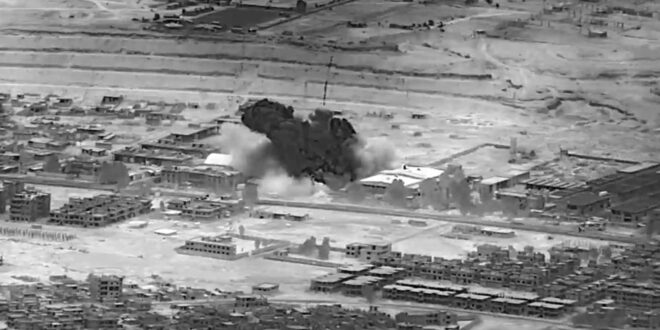An Iranian-backed extremist group threatened Wednesday to expand attacks on U.S. targets after U.S. aircraft killed multiple militants in airstrikes in Iraq following the first use of short-range ballistic missiles against American forces at al Asad Air Base west of Baghdad.
U.S. fighter jets struck a Kataib Hezbollah operations center in western Anbar province and a Katib Hezbollah command and control node near Jurf al-Saqr, south of Baghdad, early Tuesday, two U.S. defense officials told The Associated Press, speaking on condition of anonymity because of the sensitivity of the operation.
Kataib Hezbollah said eight of its members were killed in the airstrikes. U.S. officials could not confirm the deaths.
The attacks followed a retaliatory strike by an AC-130 gunship after the militants fired two short-range ballistic missiles at al Asad on Tuesday, killing the attackers as they fled in a vehicle.
Deputy Pentagon Press Secretary Sabrina Singh said the missiles caused “several non-serious injuries and some minor damage to infrastructure.”
In a statement Wednesday, Kataib Hezbollah said it was considering “expanding the scope of targets” if the U.S. military continues with its strikes. It added airstrikes “will not go unpunished.”
Attacks on U.S. installations by Iranian-backed militant groups, under the umbrella of the Islamic Resistance in Iraq and Syria, have escalated in the wake of Israeli airstrikes in Gaza. Israeli strikes began after Hamas extremists breached border defenses on Oct. 7, swarming into Israeli territory and killing 1,200 people and taking about 240 men, women and children hostage.
Since the Israel-Hamas conflict escalated, Iranian-backed militants have launched at least 66 rocket and missile attacks against U.S. facilities in Iraq and Syria, wounding at least 62 service members. The current series of attacks began on Oct. 17, the date that a blast at a hospital in Gaza killed hundreds of Palestinians.
Previously, U.S. counterattacks had focused on militant weapons caches and training centers in Syria, due to political sensitivities in Iraq. The U.S. has sought to maintain good relations with the Iraqi government despite its own close ties with Iran.
The office of Iraqi Prime Minister Mohammed Shia al-Sudani, who rose to power through the backing of an Iran-backed political coalition, called the recent escalations “a dangerous development,” reflecting the delicate balance the government must strike between Iranian factions and U.S. military presence.
In a statement, Sudani’s office called the U.S. attack a violation of the country’s sovereignty and of the U.S.-led coalition’s mission to combat Islamic State militants on Iraqi soil. The statement complained that the airstrikes were carried out without giving Iraq notice.
The Iraqi prime minister has, however, called for Iraqi authorities to pursue the attackers of U.S. bases in Iraq as he tries to maintain a delicate balance in maintaining positive ties with both Washington and Tehran.
U.S. officials speaking on background said Washington is trying to communicate that it does not seek wider conflict but that the Iran-backed attacks against American forces must stop and that the U.S. will take further action if needed.
The U.S. still maintains forces in Iraq and Syria as part of operations against the Islamic State group and its allies, which U.S. officials say receive money, weapons and other support from Iran.
Washington has pledged strong support for Israel in its conflict with Hamas and has dispatched two carrier groups, multiple squadrons of warplanes and U.S. personnel to try and keep the conflict from expanding into a regional war.
Kataib Hezbollah rose to prominence during the Iraq War as one of the “special groups,” a U.S. military term for the mostly Shiite insurgent factions fighting American and Iraq troops alongside the larger Al-Qaida in Iraq, a largely Sunni organization.
In 2009 Kataib Hezbollah was added to the State Department’s list of foreign terrorist organizations because of multiple rocket, mortar and sniper attacks against American, Iraqi and other international forces.
A series of Kaytusha rocket attacks by Kataib Hezbollah against Camp Taji in Iraq in 2020 killed three service members — two Americans and a British soldier — and seriously wounded several others. In response the U.S. conducted two rounds of airstrikes taking out multiple weapons facilities.
 Eurasia Press & News
Eurasia Press & News




